- Home
- Patricia MacLachlan
Caleb's Story
Caleb's Story Read online
Dedication
For dear Pony,
with love
—P.M.
Contents
Dedication
1
2
3
4
5
6
7
8
9
10
11
12
Excerpt from More Perfect than the Moon
1
Excerpt from Grandfather’s Dance
1
About the Author
Also By Patricia MacLachlan
Back Ads
Credits
Copyright
About the Publisher
Anna has done something terrible. She has given me a journal to fill.
She wants me to write about the farm while she’s gone, finishing school, working in town.
In Anna’s journal the words walk across the page like bird prints in the mud. But it is hard for me. It is hard to find things to write about. Not much happens here, I told Anna. Chores, schoolwork, and more chores. Anna tells me I’ll find something to write. Things to write about are all around you, she says.
I don’t think so. There’s only the cold, the skies as gray as goose feathers. And the wind.
Always the wind.
—Caleb Witting
1
“Come find me, Caleb!” called my little sister, Cassie.
She ran out the door and down the steps. Lottie barked and followed her. Nick was older than Lottie. He stayed on the porch and watched.
“I don’t have time. I mean it, Cassie!”
Cassie ignored me the way she always did when she wanted something.
“And don’t look!” she called.
I sighed and walked after her. I covered my eyes with my hand, but through my fingers I could see Cassie run to the barn.
“One, two, three,” I counted.
“Slower,” she cried.
“Four . . . five . . . five and a half.”
Papa was hitching Bess to the wagon.
“Don’t be long,” he said. “Anna’s almost ready to leave.”
“Don’t worry. This won’t take long, Papa.”
“I don’t know, Caleb. Cassie’s getting better at hiding.”
I laughed.
“At least you don’t see her feet sticking out anymore. Six, seven, eight, nine, ten,” I called.
I could hear Cassie laughing, but I couldn’t see her. I walked into the barn. It was cool and dark and quiet. A winter sharp smell filled the space.
“Cassie?”
There was no answer. There was a time when Cassie would answer me and give away her hiding place—she couldn’t help it. Not today.
May, my favorite of all our horses, was in her stall. I reached over and touched her nose, and she nickered at me. I could see her breath in the cold air. There was silence, the only sound the sound of May’s breathing. Then I heard Lottie’s bark outside, and Cassie’s voice.
“Cassie? I hear you!”
I turned. Cassie tried to run by the barn door, and I rushed out and caught her, making her squeal.
“I’ve got you, Pal!”
Cassie laughed and we began to walk back to the house, Lottie leaping and jumping in front of us. Cassie reached up and took my hand, her face suddenly serious.
“There’s a man.”
“What man?”
“Behind the barn,” said Cassie. “He’s wrapped in a green blanket. He asked me about Papa.”
I smiled.
“You and your imaginary friends, Cassie.”
She scowled at me.
“There’s a man,” she insisted.
“You’re stubborn,” I told her. “Like Sarah.”
“Like Mama,” Cassie corrected me. “You could call her Mama.”
“I could,” I said. “But you know the story, Cassie. When she first came here Anna and I called her Sarah. We will always call her Sarah.”
“I will call her Mama,” said Cassie.
I picked her up—she was so light—and Cassie put her head on my shoulder as we walked to the house.
“A man,” she whispered in my ear.
“Do you have everything, Anna?”
Sarah wrapped biscuits in a towel.
“Give these to Sam.”
Papa looked over Sarah’s shoulder.
“Some,” he said. “Not all.”
Sarah smiled.
“Papa never gets enough biscuits,” said Anna.
Anna tied up some letters with a long ribbon. Min, our orange cat, leaped up, trying to catch the ends. Her mother, Seal, slept in a basket by the fire, opening her eyes every so often to check on all of us.
“Justin’s letters?” asked Sarah.
Anna nodded.
“I read them over and over,” she said softly. “Sometimes I feel he’s standing next to me.”
Everyone was quiet. I used to tease Anna about her boyfriend, Justin. I called him Just-In-Time. But not anymore. Justin had gone to Europe to fight in the war. And no one teased Anna now. I think she worked for Doctor Sam because Justin was his son. It made her feel closer to Justin.
“Letters,” said Papa, his voice low.
“You were the masters of letter writing, you and Sarah,” said Anna.
“What does that mean?” asked Cassie.
“It means that they wrote letters to each other before they loved each other,” said Anna.
“I never got to write letters,” complained Cassie.
Papa smiled at her.
“No, you came much later.”
“You came during an early snowstorm,” I told Cassie, “with wind and snow and cold. I remember.”
“We all remember!” said Anna, laughing.
“Did I come with letters?” asked Cassie.
“No,” said Anna. “But you can write letters to me in town.”
“I will,” said Cassie, excited. “I will write you a hundred plus seven letters!”
“Here, Caleb,” said Anna. She handed me some books.
“What is this?” I asked.
“My journals,” said Anna. “And new ones. It is your job now.”
“Mine?! I’m not a writer like you, Anna,” I said.
“You’ll figure it out, Caleb. One page at a time.”
“I can’t!”
“Everyone’s not a writer, Caleb,” said Anna. “But everyone can write.”
Sarah looked out of the kitchen window.
“What is it, Sarah?” asked Papa.
“I thought I saw something. Someone, maybe. Over there.”
Papa looked out, too.
“I don’t see anyone. But I do see the beginnings of snow. And the wind is picking up. Let’s go!”
“Snow!” said Cassie. “And wind! Will someone be born?”
Sarah and Papa laughed.
“Not here,” Sarah said. “Not tonight.”
We picked up Anna’s suitcase and packages and went out the door.
“She saw the man,” whispered Cassie.
“Come on, Cass. There’s no man,” I said.
I took Cassie’s hand and we went out where snow was coming down. Sarah looked worried.
“Anna? I want you to be careful. There’s so much sickness.”
“I know you worry about the influenza,” said Anna.
“So many are sick,” said Sarah, putting her arm around Anna. “So many have died. And you see the worst of it.”
“I love working with Sam,” said Anna. “You told me once that it is important to do what you love.”
“I said that, did I?” said Sarah.
“You did,” said Anna.
“You did,” said Cassie, making Sarah laugh.
“It’s so early,” said Sarah, pulling her shawl around her shoulders. “It shouldn’t be snowing!”
“There are no rules for winter, Sarah,” teased Papa. “This is the prairie, remember? Sometimes winter comes early. If the snow is heavy, I’ll stay in town with Jess.”
Sarah kissed Papa and Anna, and they climbed up in the wagon. Papa flicked the reins over Bess’s back, and the wagon began to move off. Snow began to cover the ground.
“Anna!” I called suddenly.
Anna turned. I ran after the wagon.
“I’ll write about winter!” I shouted.
Anna waved.
I stood, watching Papa’s wagon wheels leave small tracks on the wet road. All around me was the soft surprising sound of snow falling. In the quiet, the prairie seemed larger than ever.
I’ll write about winter.
And if I’m lucky, maybe something else will happen.
2
That afternoon something happened. Something that gave me more than schoolwork and chores and weather to write about.
Snow fell heavier during the morning, and I stayed home from school. It was hard to get home from school when there were storms. Once we had to stay all night in our schoolroom; sleeping close to the woodstove in our coats and hats and mittens; making our lunches last through the night; listening to the wind moaning around the corners of the school; listening to Mr. Willet, our teacher, snore.
When the wind grew stronger, Sarah sent me out to bring in all the animals—sheep from the west meadow, the cattle, and two of the horses. Cassie helped me herd the sheep. The wind blew Cassie’s long hair loose from under her hat.
“Do we like winter?” Cassie asked.
I looked at her quickly. I could tell she wasn’t kidding.
Cassie asked questions because she wanted to know the answers. Like Sarah. I looked at Cassie and she looked back at me, her eyes as sharp as Sarah’s. My mother died when I was born, so I didn’t know if I was like her.
“We like winter sometimes,” I said.
She carried a bucket of grain in front of the sheep. They followed her as if she were their mother.
“I don’t like this,” Cassie said.
I opened the barn door and the sheep ran inside.
“You like to skate when the slough freezes over,” I said to her.
Cassie smiled.
“I like that part of winter.”
We closed the sheep pen. The smell of fresh hay filled the barn. Cassie sneezed.
“Now for the cows,” I said.
Cassie frowned at me. I pulled her hand and we raced outside, out of the quiet of the barn into the wind, Cassie’s hair flying out behind her like corn silk.
Sarah cooked soup on the stove, stirring it with a long-handled spoon. Cassie drew a picture at the table. I looked over her shoulder.
“What’s that?” I asked.
“It’s the man,” she said firmly.
Sarah turned from the stove.
“What man?” asked Sarah.
“One of Cassie’s imaginary friends,” I told her.
Sarah looked at the drawing.
“That’s lovely, Cass. And original.”
“Lovely and original,” said Cassie, imitating Sarah.
Sarah looked out the window.
“Caleb, you left the barn door open,” she said.
“I closed it. I know I did,” I said.
I put on my coat and went out. I ran my hand along the rope that we’d tied, one end to the house, the other by the barn door. When the storms were bad, anyone could get lost. A neighbor of ours had lost his way during a night storm and was found the next morning, frozen to death.
I looked in the barn, then stepped inside. Something was different. Something. May was there in her stall. The sheep bleated at me. Then . . . there was a horse in the next stall, Bess’s stall. It was a horse I’d never seen before.
“What? Who are you?” I asked, reaching out to touch the horse. I heard a sound behind me and whirled around. There, slumped against the wall, was an older man, with gray hair. He was wrapped in a green blanket. He stared at me, but he said nothing.
“Who are you?” I asked. Then, gathering courage, “Where did you come from?”
The man didn’t answer. He began to cough. I backed up.
“Wait!” I told him. “Stay here.”
And I ran from the barn, calling Sarah’s name over and over.
Sarah hurried after me to the barn, her coat flung around her shoulders.
“Who is he?” she asked.
I shook my head.
“He didn’t say.”
We opened the barn door and the man looked up at Sarah. She stepped inside and closed the door.
“Are you sick?” she asked. “There’s influ-enza here. I have to protect my children.”
The man shook his head.
“I’m not sick,” he said, his voice low. “I’m cold. Cold to the bone.”
Sarah reached out to touch his forehead briefly.
“You don’t have a fever.”
“No. I’m just cold.”
Sarah paused, then made up her mind.
“Help me get him inside, Caleb,” she said.
“There’s no need,” said the man. “I can rest here. In the barn.”
“You’ll do no such thing,” said Sarah.
The man stared at Sarah for a moment. You could tell he thought about arguing with her. Then he reached out his hand to me. I helped him up, and Sarah and I walked him out of the barn and across the yard.
When we opened the door and walked into the house, Cassie stared at the man with her sharp, birdlike look. Sarah helped the man to a chair and put a quilt around him.
“There. That’s warmer. Caleb? Get him hot tea from the stove, please.”
I poured tea into a cup and handed it to the man. I studied him very carefully. We didn’t have visitors at the farm very often, and never strangers. Cassie stood next to me.
“I told you there was a man,” she whispered.
“Yes. You did,” I said, my voice soft.
Seal got up from her basket by the fire and came over to sniff at the man.
His hands shook when he drank, and Sarah helped him. He leaned back in the chair.
“That’s good. Thank you.”
“You’re welcome. I’m Sarah Witting and these are my children, Caleb and Cassie.”
“Cassie?” The man’s face changed.
“And your name?” asked Sarah.
The man didn’t speak for a moment.
“John,” he said softly. “My name is John.”
“Well, John, you are welcome to stay here. There’s an extra bed upstairs because Jacob has taken our daughter, Anna, to town.”
The man, John, sat up a bit.
“Jacob?” he asked.
“My husband, Jacob. Do you know him?” asked Sarah.
“Yes,” he said, his voice low.
“Did you come to see him?” Sarah asked.
There was a silence.
“Yes,” John said after a while. “Yes, I came to see him.”
“He didn’t say you were coming,” said Sarah.
John took another sip of tea.
“He didn’t know,” said John.
Another silence.
“Caleb, John’s tired. Please take him to Anna’s room so he can rest,” said Sarah.
I took John upstairs. He stood in Anna’s room, looking around.
“My sister, Anna, is finishing school in town. And working for a doctor,” I told him.
John nodded and sat down on the bed. He looked out the window, not speaking. He reached over and touched the table by the bed, a strange look on his face. Then he lay back on the bed, closing his eyes. I waited for a bit. Seal appeared in the doorway and jumped up on the bed beside John. She lay down.
“Seal,” I whispered. “Get down.”
But Seal only looked at me.
“I’m sorry about the cat. Her name is Seal. Do you want anything?” I finally whispered.
John said nothing. He was already asleep. Very quietly I left.
Downstairs Cassie was back at the table, drawing. Sarah folded clothes.
“Is he comfortable?” she asked.
I nodded. “Asleep. Seal is sleeping next to him.”
“Really?” said Sarah, surprised. “Seal is very particular.”
“Is he a robber?” asked Cassie.
Sarah smiled.
“If he is a robber, he isn’t a very good one,” she said. “He’s sleeping.”
I sat down and opened the empty book.
“If Anna were writing in this book,” I said, “she would begin a story. ‘Once upon a time a strange old man visited the Witting farm . . .’”
“A robber,” said Cassie slyly.
“Stop that, Cassie. He is not a robber,” said Sarah.
“Now I have something to write about in my book,” I said.
“There are always things to write about,” Sarah said. “Thoughts, fears, wishes, hopes, dreams.”
I looked across the table at Cassie. Her mouth formed the word “robbers.”
I smiled and began to write.
At last something has happened here. Not just snow and wind and chores. A strange man has come to the farm. Cassie found him first.
He is not imaginary.
But he is mysterious.
3
The wind howled all afternoon, and when I looked out the window I couldn’t see the barn. Cassie drew pictures by the woodstove, and Sarah read, stopping every once in a while to add vegetables to the soup. No sign of John.
“Should I go upstairs and check on him?” I asked Sarah.
“No, Caleb. Let him be. You could feed the animals, though.”
I put on my coat and gloves.
“Remember the rope, Caleb,” said Sarah, peering out the window. “You can’t see a foot in front of you.”
“I’ll remember.”
“And your hat, Caleb.”
“Sarah!”
Sarah laughed and opened the door for me, and I went out into the wind and snow. There were already drifts, and I took hold of the rope, following it all the way across the yard, stumbling in the snow. The noise of the wind was so loud that I was surprised by the quiet of the barn when I stepped inside. I stood in the middle of the barn and looked all around. Papa had once said that the barn in winter was the most peaceful place he knew.

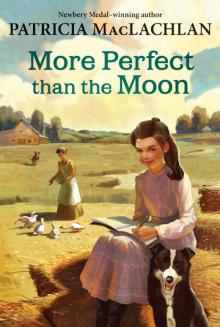 More Perfect Than the Moon
More Perfect Than the Moon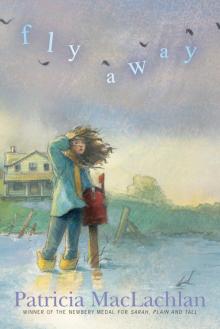 Fly Away
Fly Away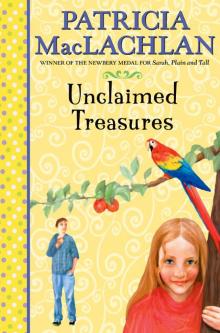 Unclaimed Treasures
Unclaimed Treasures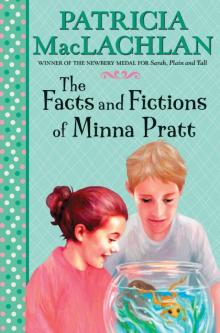 The Facts and Fictions of Minna Pratt
The Facts and Fictions of Minna Pratt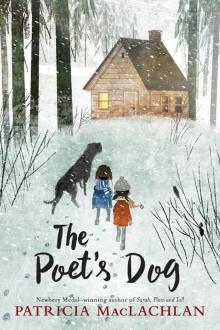 The Poet's Dog
The Poet's Dog Journey
Journey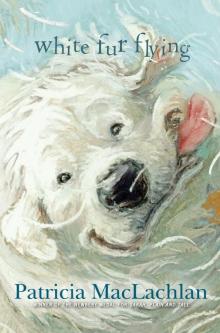 White Fur Flying
White Fur Flying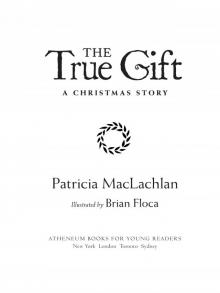 The True Gift: A Christmas Story
The True Gift: A Christmas Story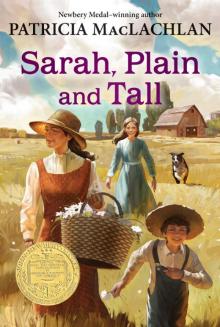 Sarah, Plain and Tall
Sarah, Plain and Tall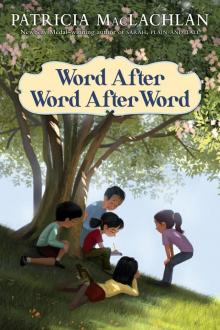 Word After Word After Word
Word After Word After Word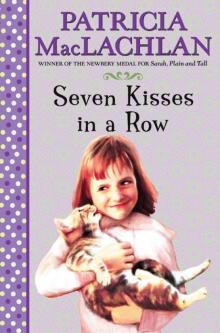 Seven Kisses in a Row
Seven Kisses in a Row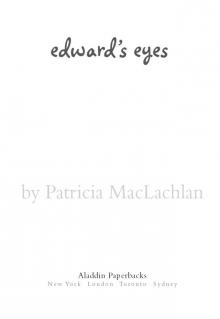 Edward's Eyes
Edward's Eyes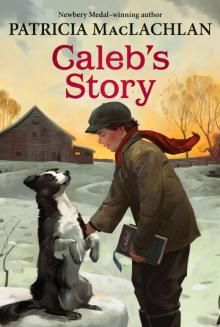 Caleb's Story
Caleb's Story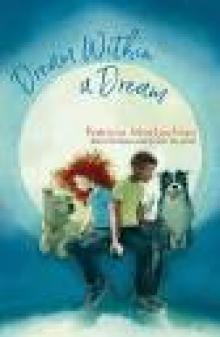 Dream Within a Dream
Dream Within a Dream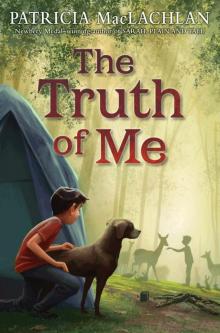 The Truth of Me
The Truth of Me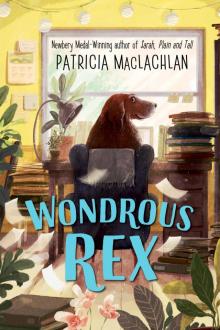 Wondrous Rex
Wondrous Rex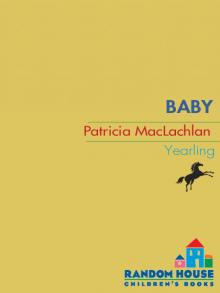 Baby
Baby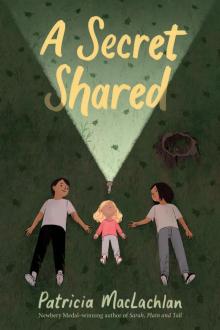 A Secret Shared
A Secret Shared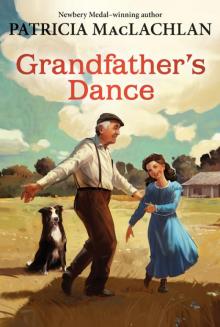 Grandfather's Dance
Grandfather's Dance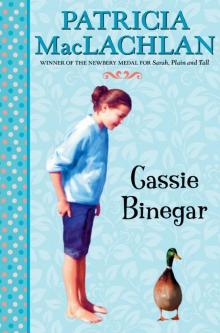 Cassie Binegar
Cassie Binegar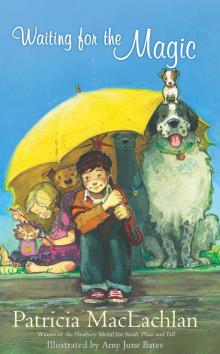 Waiting for the Magic
Waiting for the Magic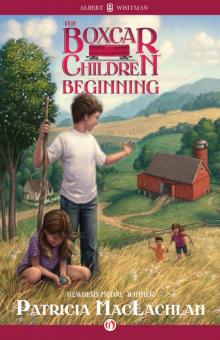 The Boxcar Children Beginning
The Boxcar Children Beginning My Father's Words
My Father's Words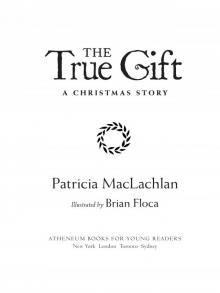 The True Gift
The True Gift